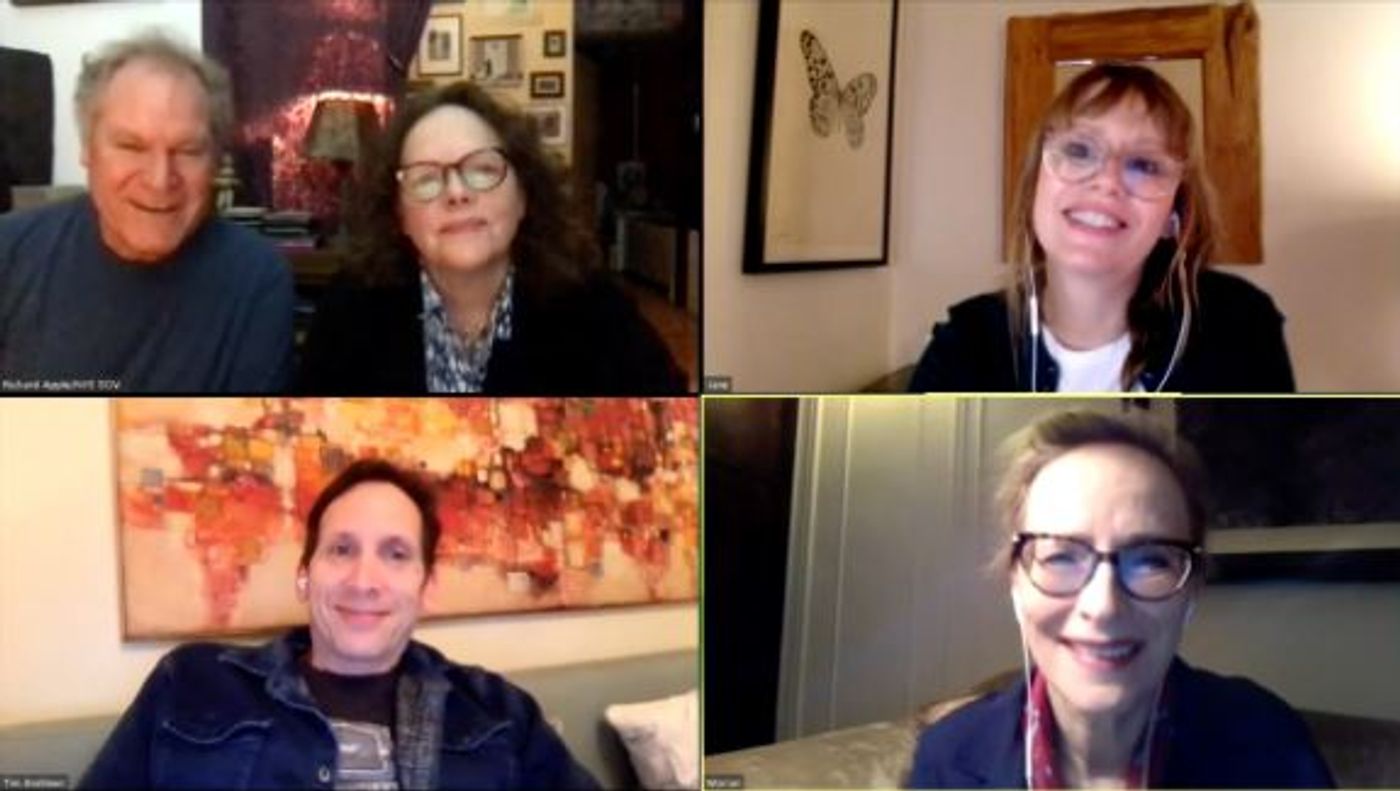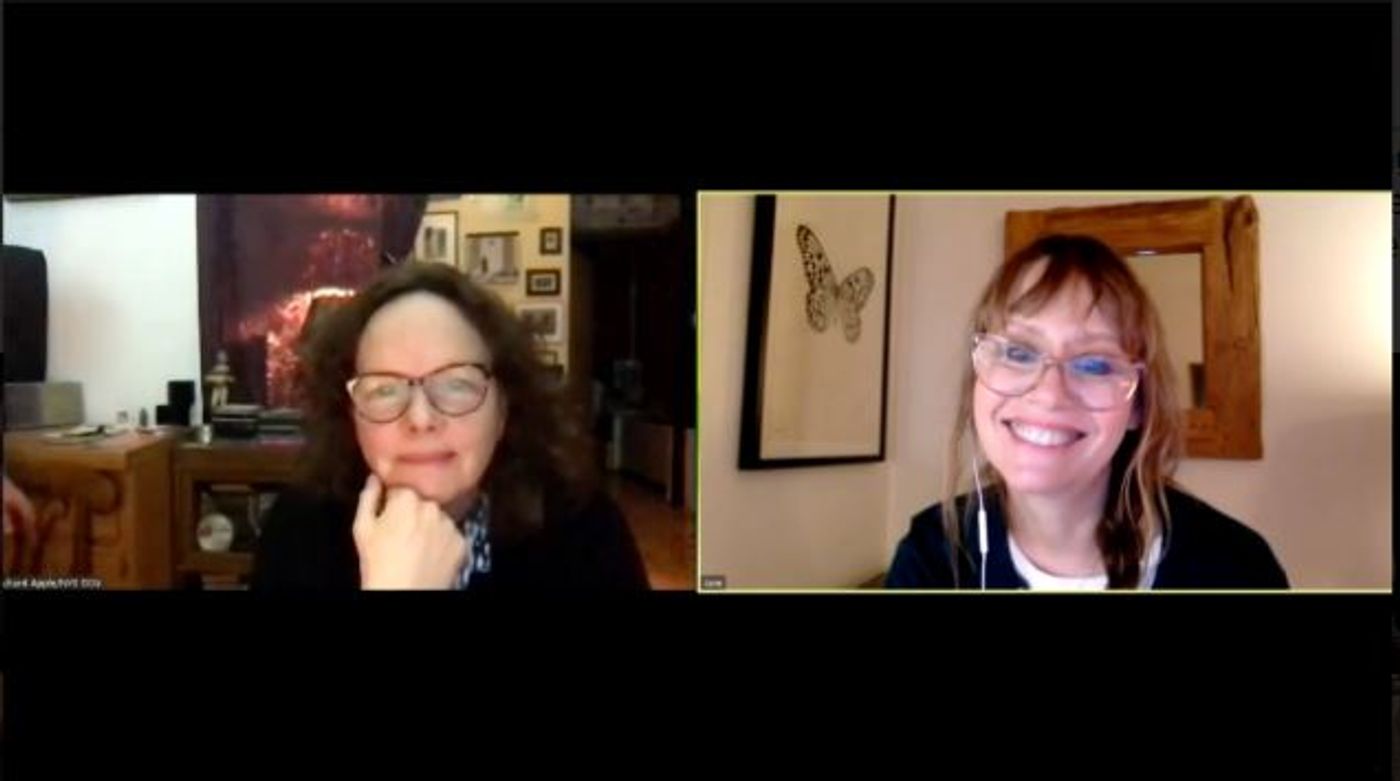Review: Richard Nelson Zooms In On The Apples in WHAT DO WE NEED TO TALK ABOUT?
The playwright/director's latest Rhinebeck Panorama drama is an online family chat.
"The first cough in the audience and who's listening to the play?," wonders a character when contemplating the return of live theatre.

Sally Murphy, Laila Robins and Stephen Kunken
(Photo: Joan Marcus)
It's a simple, but surely potent truth, typical of many that have been thoughtfully uttered in playwright/director Richard Nelson's Rhinebeck Panorama, the most important series of American plays since August Wilson's Pittsburgh Cycle.
Nearly ten years ago, Election Night 2010 in the middle of President Barack Obama's first term, Nelson and The Public Theater introduced us to the left-leaning adults comprising the Apple Family of Rhinebeck, New York in THAT HOPEY CHANGEY THING, a quiet, Chekhovian drama that took its title from Sarah Palin's sarcastic remark about the fledgling administration and, in many ways, pondered what it meant to be an educated white liberal in 21st Century America. ("Why is it that every time I question what we've become... I'm met with the same: 'but they're worse.' Since when has not being worse become what we are?")
A unique feature was that the play took place on the date of its opening night, with reviewing press not attending until that date. The three subsequent Apple Family Plays took place, and opened, on the tenth anniversary of 9/11, Election Day 2012 and the fiftieth anniversary of JFK's assassination. Nelson then pivoted to a new Rhinebeck family, the Gabriels, for three plays set during the year leading up to the 2016 election, which was followed by a visit with the Michael family this past October.
All of the plays in the series, set around mealtime, were cast from an extraordinary pool of stage actors, core members of which have returned for the newest visit with the Apples, WHAT DO WE NEED TO TALK ABOUT?: CONVERSATIONS ON ZOOM, which had its livestreamed opening last night and is available through May 3rd at The Public Theater's website.
As noted in the subtitle, the socially distant siblings have taken to visiting on Zoom, the Internet platform for group meetings that has surged in popularity during the coronavirus pandemic.
Lawyer Richard (Jay O. Sanders), who in the first play of the series had taken a position with a Republican-supporting firm, now works for the state and is marveling at the sudden popularity of his boss, Governor Andrew Cuomo ("I've Skyped with a few guys in our office. Their wives are saying - 'What have you been complaining about all these years?' 'You come home crying....' 'He's a nice guy...'").
Richard has been quarantined at the home of his sister Barbara (Maryann Plunkett), a high school history teacher just released from the hospital after surviving a case of COVID-19.
Since Sanders and Plunkett are a real-life married couple, the characters can sit together and share a screen. This isn't the case with actors Sally Murphy and Stephen Kunken so Richard and Barbara's sister Jane, a free-lance writer, is seen separately from her live-in partner Tim (Stephen Kunken), who has tested positive for the virus and is quarantined in his own room.
Unlike the others, including elementary school teacher Marian Apple (Laila Robins), Tim, an actor and the manager of a now-closed restaurant, has seen his income completely halted and a prominent theme of the play is how the virus has created a privileged class of people who can work from home. Jane is even considering pitching a magazine story about how the virus is expected to cause a suburban real estate boom from well-off at-home workers wanting to avoid crowds.

(Photo: Joan Marcus)
After Tim tells a sweet and humorous story about his friend, the beloved actor Mark Blum, who died a month ago from complications associated with COVID-19, Barbara brings up a project she's been working on with her students based on "The Decameron."
"It's people telling each other stories while they wait out a plague. Hundreds of years ago in Italy," Jane chimes in.
"What's so interesting," Barbara explains, "is that these people, the characters, don't tell stories about plagues - instead they're about sex, intrigue, some are funny... some quite magical..."
So each of them takes a turn at story-telling, including an amusing factual account concerning the ineptitude and unpopularity of President Franklin Pierce and a touching moment referencing Chekhov's THE CHERRY ORCHARD and a remembrance of a deceased character played in a previous Apple play by Jon DeVries.
Unlike the previous Rhinebeck plays, where conversation accompanies activity, providing a more leisurely pace, the talk is the uninterrupted focus here. And though the hour-long play seems more briskly performed by comparison, the beautiful naturalism accomplished by Nelson and his accomplished ensemble remains. Plunkett, in particular, thrives in this subtle, realistic realm.
When THAT HOPEY CHANGEY THING first opened, Nelson referred to it as a "disposable" play, written quickly and heavily steeped in the national conversation of its time. Now, when surveying American theatre a fifth of the way through this century, his "Rhinebeck Panorama" seems indispensable.
Reader Reviews
Videos

